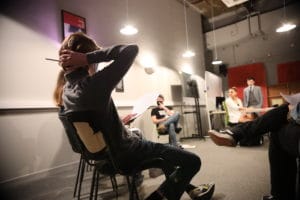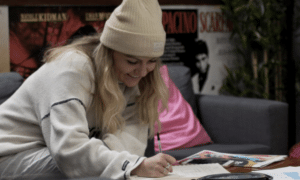Easter Series 2022: Round up
Screen and Film School were delighted to host our second annual Easter Series last month- a week-long series of interactive virtual workshops, hosted by our Brighton, Manchester, and Birmingham Colleges.
The series ran from 19th – 22nd April and delved into an amazing variety of film-based worlds including short film production, set design, screenwriting and pitching ideas.
With a number of our inspiring industry lecturers hosting the workshops, we were thrilled to see how many people tuned in and engaged with the sessions. If you weren’t able to make the sessions, check out our round up below!
“It was fantastic, I enjoyed it and found some really useful information. Thank you.” – Easter Series Attendee
An Interactive Guide to Short Film Production with Dan Ford
Our Easter Series kicked off with Brighton lecturer Dan Ford giving us the run down on how he produced his Channel 4 short film Next Week as part of their Random Acts series.
Attendees learned how much work goes into turning a script into a shooting schedule, even for a three-minute short! After receiving the script and devising a schedule, attendees were encouraged to split the scenes and locations into assets and begin allocating their £4,000 budget towards essentials like equipment, venue hire, actors, and travel/food costs for crew members. Our favourite budget suggestion included “getting everyone to work for free and using the four grand to buy Lobster for the whole crew!”
Set Design For Screen – Character, Story & Plot with Samantha Babrovskie
Day two of our Easter Series commenced with a workshop on Set Design for Screen, led by one of our Manchester and Birmingham lecturers, Sam Babrovskie.
Showcasing her years of experience in production design, Sam used Alfred Hitchcock’s Rear Window (1954) as an example to emphasise how props and set design are integral to providing the audience with visual clues about character, story, and plot. Throughout the session the attendees were given a series of tasks to complete such as identifying how props and set design were used as visual indicators in the BBC TV series What Remains (2013). They were also asked to pick several items from their home environment to present to the class, with each item providing a visual clue to the audience about their own character (if they were a character in a film). The class were then given the opportunity to ask Sam lots of questions about life in the production design industry, which highlighted how crucial production design is in bringing stories to life on the big screen!
“Really open and respecting environment – it was nice to be a part of the short series, thanks for the offer!” – Easter Series Attendee
Screenwriting with Sarah Drew
Day three of the Easter Series kicked off with a workshop on Screenwriting, led by Screen and Film School Birmingham lecturer, Sarah Drew. Utilising her varied industry knowledge Sarah broke down each component needed to create a successful screenplay.
Throughout the session attendees got to understand how character drives plot, the three-act structure and much more. Sarah gave out some key tips for writing good scenes as well as her own checklist for improving scenes the group had already created. Additionally, the group delved into the importance of subtext showing their understanding on it through films such as Doubt (2008), Sideways (2004) and Inglorious Basterds (2009). Sarah explained to the group that the art of screenwriting is a lot of what happens beneath the surface. After all people rarely say what they truly mean!
Ideas Generation and Pitching Session with Sam Barnett
For our final Easter Series Workshop, Manchester lecturer, Sam Barnett, led an Ideas Generation and Pitching session, which focused on the development of film from conception to production.
In preparation for the workshop all attendees were asked to bring an initial idea for a film, which they then developed throughout the session. Using his experience as a film producer, Sam taught the class how to create a concise logline that could potentially sell their film, as well as providing creative tips on how to make films on a low budget. The workshop resulted in a diverse array of ideas from all attendees, such as pitches for films in the supernatural, futuristic, and dystopian genre. The class were encouraged to give each other feedback on the pitches, as well as Sam providing his professional opinion on areas for development and ideas for funding. The session highlighted the skill shortages within the film industry, and Sam advised all filmmakers to start their careers by making short films whilst they’re gaining experience and becoming more established in the film industry.
A huge thank you to everyone who hosted and participated in the workshops- we can’t wait to see you all again soon!




